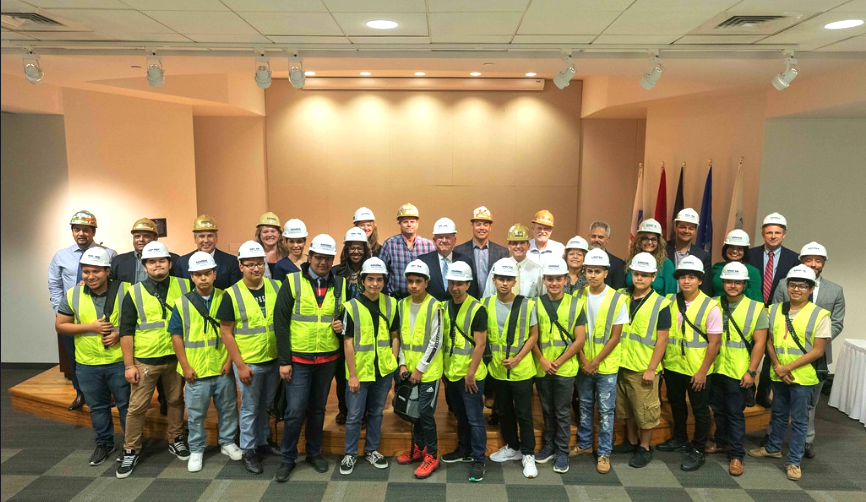 How do you get a job without the right skills or credentials? How do you gain the right skills or credentials to get or succeed in a job if you can’t pay for the education needed to obtain them? From an employer’s perspective, how can you attract eager workers, ensure they develop the skills they need, observe their suitability for long-term employment, and see a return on your investment?
How do you get a job without the right skills or credentials? How do you gain the right skills or credentials to get or succeed in a job if you can’t pay for the education needed to obtain them? From an employer’s perspective, how can you attract eager workers, ensure they develop the skills they need, observe their suitability for long-term employment, and see a return on your investment?
These questions underscore an urgency within the workforce, especially within the construction industry. The skills needed to succeed in construction have evolved rapidly and employers are pressured to attract and retain talent in order to combat the challenges brought on by an aging workforce.
Apprenticeships are a recognized approach to address these challenges. Through my role as MAREK’s chief operating officer and as a member of the Greater Houston Partnership’s UpSkill Houston initiative executive committee, I’ve developed an even stronger appreciation for the potential that well-designed apprenticeships and work-based learning programs can have to help employers attract talent and cultivate a sustainable workforce.
Apprenticeships benefit employers and employees
Apprenticeships combine paid work with work-based-learning, classroom instruction, and mentorship. Simply put, apprentices earn money while they learn and obtain industry credentials. This particular approach alleviates the financial stress associated with pursuing education beyond high school. Academic studies report that work-based learning opportunities like apprenticeships can yield earning gains for workers of about $6,000 per year in the ninth year of enrollment.[1]
Employers can design programs to match their company’s demands, structure, and culture. Apprenticeships can be built around the number of training hours a participant needs to complete (i.e., time-based) and/or specific skills a participant needs to demonstrate (i.e., competency-based). Wages should increase incrementally as apprentices can perform new skills.
Programs may be registered with the DOL, which provides management guidelines and signifies that the program meets national standards. Such programs are called Recognized Apprentice Programs (RAPs). Programs that are developed and managed without being registered are referred to as Industry-Recognized Apprenticeships (IRAPs). These types of programs can meet very high and robust labor expectations. S&B Engineers and Constructors’ apprenticeship programs are examples of this. Employers may also be eligible to receive federal or state funding to support program costs, but that’s a topic for another article.
It is incumbent on employers and other leaders to attract and retain talent. Employers can nurture and develop new employees from younger generations, other industries, or military service and lower the risk of employees leaving the job or industry. Mentors also play critical roles in supporting apprentices.
Emerging models offer greater potential and reach
Over the last year, I’ve spoken with my counterparts in the industry and through UpSkill Houston about specific strategies to identify ways to strengthen greater Houston’s talent pipeline for good careers that don’t require a bachelor’s degree. There is greater opportunity for employers to expand apprenticeships beyond traditional craft professions into more professional roles. These types of IRAPs may help foster innovation in other parts of our industry to fill real demands from new talent pools.
Recently, so-called “pre-apprenticeship” programs have opened the door to work-based-learning to an even younger generation. This past fall, MAREK launched a program in partnership with Houston Independent School District (HISD) and Houston Community College (HCC) that allows high school students to earn Level 1 certificates from HCC and drywall credentials by the time they graduate. Successful students will graduate with job offers from MAREK. We patterned our program after a similar program developed by TRIO Electric, HCC and Spring Branch Independent School District. Spring Branch students receive on-the-job training and hold paid summer internships at TRIO Electric while earning credit at HCC. Successful students graduate high school with industry-recognized Helper Level 1 certificates, job offers from TRIO, and in some cases, scholarships to continue their education at HCC. TRIO’s first Houston cohort graduated in May 2019 and its third local cohort entered the program this past fall. TRIO is replicating its model in Austin and outside Dallas.
Tapping into a budding workforce that’s still in high school can help students understand construction’s workplace and safety culture as well as industry norms and procedures. It also helps students explore and recognize roles about which they otherwise might not have known. This can help students build successful careers and help employers build or strengthen a talent pipeline to ensure a well-qualified workforce in the future.
Apprenticeship Development Resources
U.S. Department of Labor information and guides to develop registered apprenticeship programs: https://www.apprenticeship.gov/employers
Apprenticeship playbook for professional jobs, developed by the Chicago Apprentice Network, “Bridging the Gap Between Talent and Opportunity”: https://www.accenture.com/us-en/about/company/apprenticeships
[1] Parilla, Joseph and Sifan Liu. “Talent-Driven Economic Development: A new vision and agenda for regional and state economies.” Report, October 2019. (Published by Metropolitan Policy Program at Brookings.)

